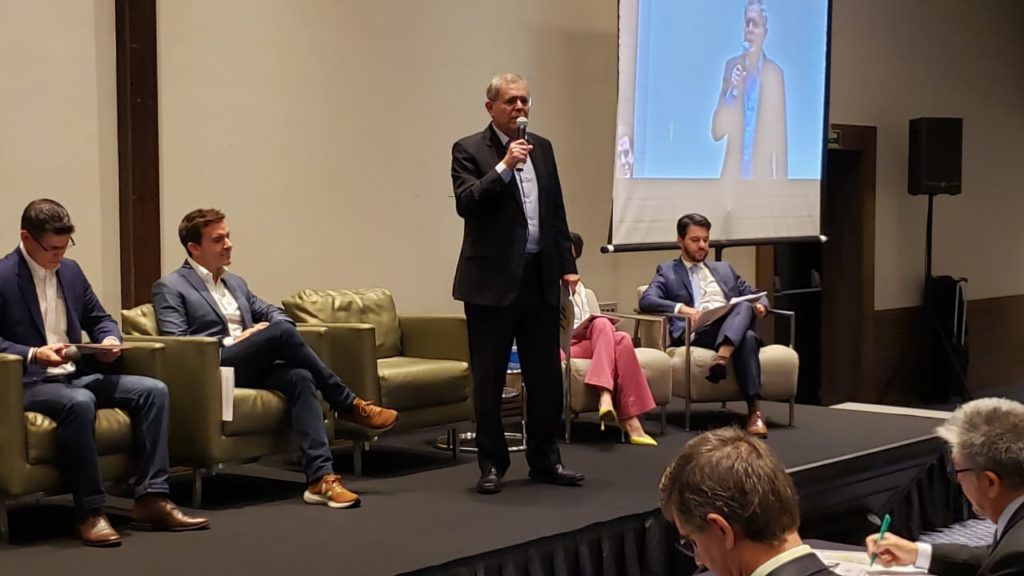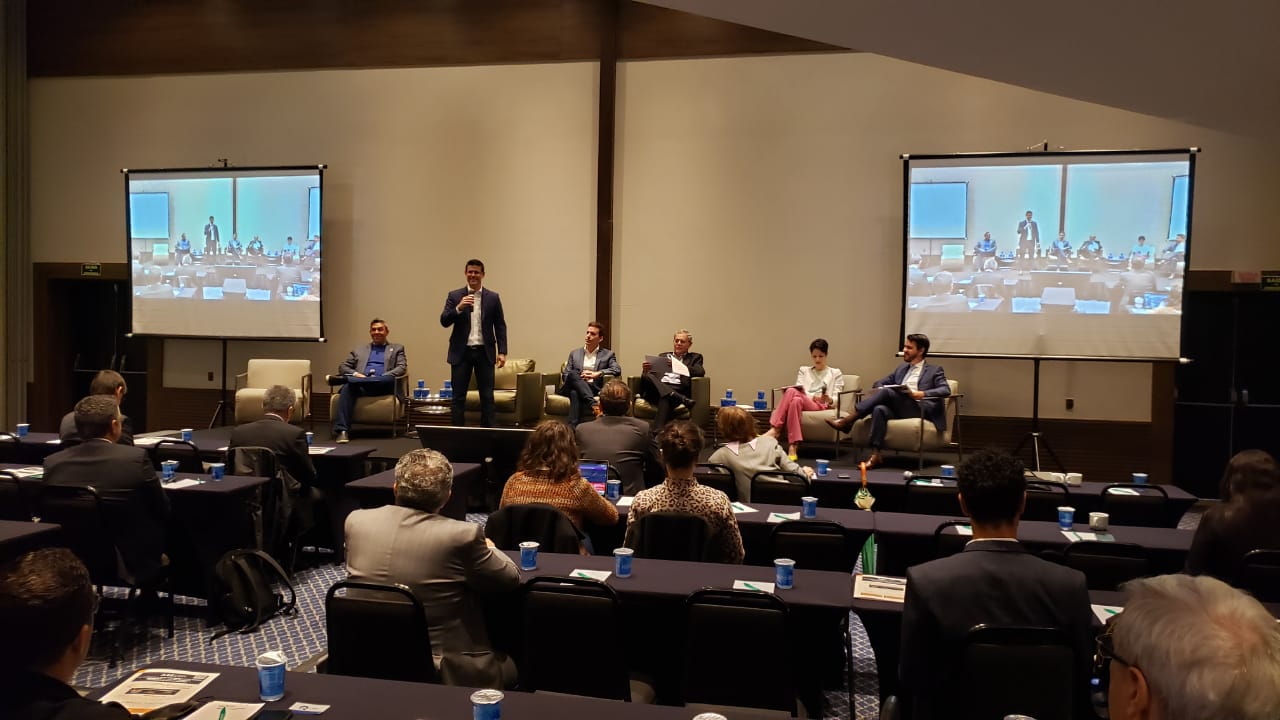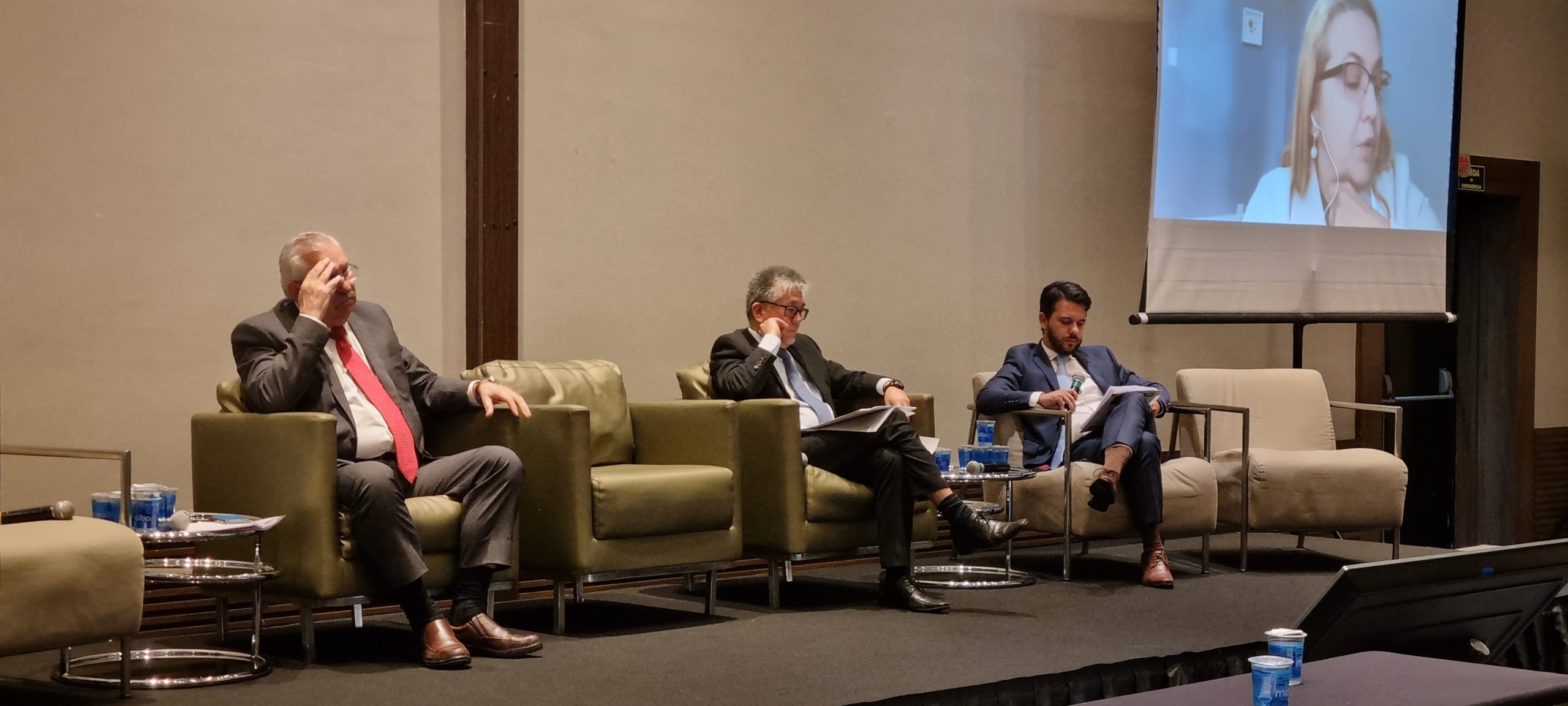Representatives of the candidates, Casa Jota and the Brazilian Association of Software Companies (ABES) discussed the challenges for a Nation Project in the Digital Age short, medium and long term, highlighting the challenges regarding qualification and job creation in the sector, tax reform, digital inclusion, modernization and digital transformation in the country
ABES – Brazilian Association of Software Companies – and Jota received this Wednesday morning (08/10), in São Paulo, representatives of the candidates for the Presidency of the Republic: Antonio Neto, representative of candidate Ciro Gomes (PDT); Nelson Fujimoto, representative of candidate Luiz Inácio Lula da Silva (PT); and Susana Kakuta, representative of candidate SIMONE TEBET (PMBD).
The objective of the meeting was to debate the proposals for the construction of a Project of Nation. On that occasion, ABES presented its Contributions to Electoral and Government Programs 2023-2027, highlighting its purpose of helping to build a More Digital and Less Unequal Brazil, and its belief in information technology as a fundamental agent for the democratization of knowledge and the creation of new opportunities, aiming to improve the quality of life for all and all, in an inclusive and equitable way. The entire document can be downloaded here.
In ABES' view, for Brazil to be able to unlock its digital transformation, it is necessary to promote debate and reflections on a regulatory political agenda in the next 4 years, which should be guided by the convergence of its 4 thematic axes: Economy; State and Citizenship; Data, New Technologies and Digital Convergence; and International Integration🇧🇷 “We need to think about Brazil with ambitious plans to become a digital, competitive, modern, safe and reliable economy. A prosperous future for the country requires the adoption of agile and consistent policies, applicable to a reality where technology and data are increasingly ubiquitous. Therefore, by listening to the representatives of the candidates and their proposals, we not only encourage debate, but also help to guide what our economy and population really need”, declares Paulo Milliet Roque, President of ABES.

Paulo Milliet Roque, President of ABES
For Prof. Claudio de Lucena, who together with journalists Cristina de Luca and Silvia Bassi, helped in the elaboration of ABES contributions, thinking about the challenges for the country is an important exercise, “which starts from ABES' perception that the banner of entrepreneurship and of economic development is important, but that doesn't make much sense if it's fluttering alone. Digital transformation, today, is a premise for the full exercise of citizenship, and an agenda that in principle is business becomes strategic for any government that wants to fulfill its objectives with absolute efficiency”, he pointed out.
For Fabio Rua, vice president of ABES, this is a discussion that will certainly be deepened. “These proposals need to be evaluated in the light of 5G technology, and that bring our country more speed, more agility and more security from a legal and tax point of view, so that we are able to continue growing, always with dialogue, and attract more investments for the country”, he declared.
For Andriei Gutierrez, Leader of the ABES Regulatory Committee, it is important to think about digital inclusion and universal and quality access to the internet. “It is an essential element for citizenship, and public policies for this issue need to be thought of. We need to strengthen governance and protect innovation and legal certainty for providers. We need to strengthen 5G coverage, which is important for the industry, and define minimum criteria for the quality of connections. Digital government has advanced a lot in recent decades, and we see that there is a digitization policy, which needs to remain a priority issue, in order to advance in the implementation of a digital government, always with transparency and multisectoral participation. We need to take advantage of the digital transformation to engage citizens to take a more active role in defending their political rights and fighting digital invisibility. Thus, we will have a national project that will look at the citizenship of all”, he said.
According to Loren Spindola, Leader of the Artificial Intelligence Working Group at ABES, privacy is a fundamental right, and it is necessary to guarantee the safety of citizens and the security of the international transfer of data. “We need a cyber policy so that new technologies are implemented securely, and have an AI framework that guarantees its implementation with legal certainty. We need to facilitate the regulatory environment to be increasingly present in the global value chain”, he explained.

Andriei Gutierrez, Deputy Director and Leader of the Regulatory Committee of ABESRepresentantes pointed out education as a key factor for the development of the technology market. The debate was mediated by Fernando Mello, co-founder of JOTA, political scientist and director of JOTA Labs. Check out some highlights of the event below and subscribe to the full debate on ABES YouTube channel.
* Antônio Neto, representative of candidate Ciro Gomes (PDT):
It is necessary to repeal amendment 95 (which established the New Fiscal Regime within the scope of the Fiscal and Social Security Budgets of the Union) and to confront the political governance of Brazil. Either we change that, or we will continue with the same problems.
Regarding the workforce, it is necessary to solve the problem of professional qualification and face the problem of the professional blackout. We need to reformulate education, from the beginning, with a focus on mathematics and Portuguese, and mirror the model currently applied in Ceará, so that Brazil is among the 15 most advanced countries in the world.
Today, we have many people with degrees in different areas, and turning these people into professionals in the technology area is a solution to the professional blackout, while providing opportunities for those who are out of the job market. We have manpower that needs to change professional areas, and in partnership with the private sector, we can move forward in this matter, solving the problem of lack of manpower.
The State will have to return to being the great inductor of innovation. Either we put effective conditions for investments, whether public or private, to create startups and attract foreign companies, or nothing will happen. We will have to organize ourselves so that regulatory agencies work in a concrete way, or we will have nothing in the future. The quality of our connections today is terrible, and we will need to demand quality from providers so that the population has access to quality internet, within minimum parameters.
* Nelson Fujimoto, representative of candidate Luiz Inácio Lula da Silva (PT):
Our country is going through a very serious moment, with 20 million people who have returned to the point of misery. We immediately have the great task of establishing guidelines to overcome this moment. One of our axes is to work on digital inclusion, in three fundamental aspects: bringing infrastructure to those who don't have it, giving access to equipment that allows access, and promoting digital literacy - because with 5G, we need to train people to fully use of this new technology.
The issue of qualification for the area of technology is fundamental, those who do not have manpower are left behind. Therefore, it will be necessary to carry out mass training, generating jobs and directing professionals to where there is demand. We have this expertise and we are open to partnerships to put this into practice. We need to invest in technology-based companies, in those that are here, and attract outsiders to invest here.
From a regulatory point of view, it is important to have a regulation for the data produced here in Brazil. We need to give more security to the storage and treatment of data here in Brazil, providing conditions for having local data centers. We need to invest here in Brazil. We need to regulate the topic of algorithms, investing in training people in the area of artificial intelligence. If we want digital sovereignty, we need to have data here and empowered people here. And to stimulate competitiveness, we need to have an industrial policy.
* Susana Kakuta, representative of candidate SIMONE TEBET (PMBD):
If, on the one hand, we currently have 20 million people in a state of poverty, we also have an important number of unemployed young people, who need to enter the job market. At the same time, the ICT sector, which is highly elastic in terms of job creation, demands specialized labor. We need to promote knowledge in order to insert young people into this market, and retain talent in the country. Education is the key to solving this issue. It is necessary to think about the future of work, narrowing the gap between the knowledge that is required and the knowledge that is offered by educational institutions. Acting on these broad lines means opening a window of opportunity. The technology sector can make a difference in society, with high value-added jobs.
A new sector cannot develop with old policies, and this is one of Brazil's biggest bottlenecks. There is a gap between the global isonomy of competing countries and what we have in terms of public policies here. When we talk about new policies, we need to put full education at the center of the strategy, so that all programs that can address the issue of employability can be included.
We need to focus education on innovation. We also need to move towards global competitive equality, and share public and private investments in STI. In order to innovate, there are priority guidelines, such as promoting a logic of public and private participation in innovation, which is a major factor in job creation, especially for young people who leave university and find it difficult to find a job.
The regulatory priority of a new government is to provide isonomy to Brazil, enabling local companies to better interact with global companies, with legal certainty.

Antonio Neto, Nelson Fujimoto, Fernando Macedo and Suzana Kakuta (online)
About ABES
ABES (Brazilian Association of Software Companies) aims to contribute to the construction of a more digital and less unequal Brazil, in which information technology plays a fundamental role in the democratization of knowledge and the creation of new opportunities for all. In this sense, it aims to ensure a business environment conducive to innovation, ethical, dynamic, sustainable and globally competitive, always in line with its mission to connect, guide, protect and develop the Brazilian information technology market.
Currently, ABES represents approximately 2 thousand companies, which total about 85% of the software and services segment's revenue in Brazil, distributed in 24 Brazilian States and the Federal District, responsible for the generation of more than 210 thousand direct jobs and annual revenue of the order of R$80 billion in 2020.
In order to encourage the participation of associates in the entity's projects and in the direction of the Brazilian software and services industry, ABES created, in 1995, the Working Groups (GT) that, since 2013, started to use the name of Committees . They function as forums for discussing specific issues related to the sector, presenting proposals and action plans.
In line with its purpose, ABES launched the “Mobilization for the reduction of inequality”, in partnership with ReUrbi and the Third Sector Observatory, with support from Weber Shandwick, to support social inclusion projects that promote training in the digital area , through the resources obtained by recycling IT equipment discarded by companies. This initiative is in line with recent discussions at the climate summit, and aligned with the 8 Sustainable Development Goals (SDGs) of the United Nations (UN) Global Compact, and ESG (Environment, Social, Governance) best practices. .












